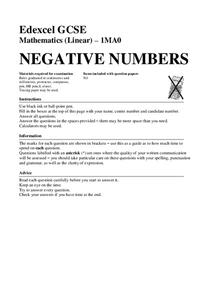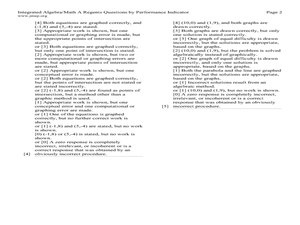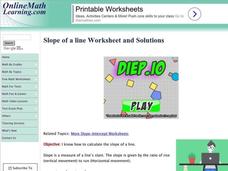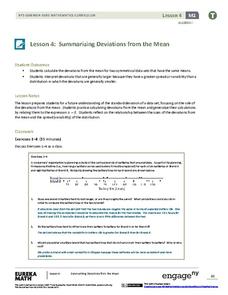EngageNY
Complex Numbers as Vectors
Show your math class how to use vectors in adding complex numbers. Vectors represent complex numbers as opposed to points in the coordinate plane. The class uses the geometric representation to add and subtract complex numbers and...
Curated OER
Negative Numbers
In this algebra worksheet, students review basic division and multiplication concepts to solve problems using order of operation. This worksheet contains 11 multiple choice questions.
Curated OER
Shortest Distance Problem
In this algebra worksheet, students solve 1 shortest distance problem. This is a challenging problem that requires students to apply knowledge and use their critical thinking skills. A fully explained solution is included.
Curated OER
Integrated Algebra/Math A Regents Questions: Systems of Quadratic/Linear Equations
In this system of equations worksheet, students solve 5 graphing and short answer problems. Students graph quadratic and linear systems of equations to find the solutions to the system.
Curated OER
Slope of a Line
For this interactive worksheet, 8th graders review how to calculate the slope of a line, then solve 10 problems, given 2 points. Students may click for further information, on finding a slop of a line.
Curated OER
Solving a System of Equations
For this Algebra II worksheet, 11th graders determine the solution to a system of one linear and one quadratic equation. The two page worksheet contains a combination of nine multiple choice and free response questions. ...
Curated OER
Concepts, Patterns, Formulas, Substitution
In this algebra instructional activity, students define algebraic terms and rewrite them using math symbols. There are 10 problems drawing correlations to geometry as well as algebra.
Curated OER
Solving Equations by Distributive Property
In this solving equations worksheet, students use the distributive property to find the value of the unknown. This one-page worksheet contains 10 multi-step problems. Answers are provided.
West Contra Costa Unified School District
Key Features of Graphs
The key is ... After a day of instruction on key features of graphs, groups create a poster and presentation on the key features of their given function graph. The resource provides an extension activity of "telephone" using...
EngageNY
Summarizing Deviations from the Mean
Through a series of problems, learners determine the variability of a data set by looking at the deviations from the mean. Estimating means of larger data sets presented in histograms and providing a way to calculate an...
EngageNY
Logarithms—How Many Digits Do You Need?
Forget your ID number? Your pupils learn to use logarithms to determine the number of digits or characters necessary to create individual ID numbers for all members of a group.
EngageNY
Describing the Center of a Distribution
So the mean is not always the best center? By working through this exploratory activity, the class comes to realize that depending upon the shape of a distribution, different centers should be chosen. Learners continue to explore...
EngageNY
Analyzing a Graph
Collaborative groups utilize their knowledge of parent functions and transformations to determine the equations associated with graphs. The graph is then related to the scenario it represents.
EngageNY
Summarizing Bivariate Categorical Data with Relative Frequencies
It is hard to determine whether there is a relationship with the categorical data, because the numbers are so different. Working with a familiar two-way table on super powers, the class determines relative frequencies for each...
Shmoop
Coordinate Proofs
How do you know you know? Prove it! The guide goes through several examples and includes a link to a video to teach learners how to work through coordinate proofs. The goal is to prove that different shapes are indeed that shape.
West Contra Costa Unified School District
Talking About Distance, Rate and Time
Connect the tortoise and the hare fable to mathematics. Learners first identify key terms related to distance, rate, and time. They then solve distance/rate/time problems using different representations.
Curated OER
Precision and Accuracy in Measurement
In this Algebra I worksheet, students differentiate between precision and accuracy is measurement. The four page worksheet contains thirty-five problems. Answers are not included.
Mt. San Antonio Collage
Synthetic Division and Zeros of Polynomial Functions
More than just a worksheet, this guide provides the description of many of the polynomials theorems to assist the learners. Starting with synthetic division, class members are then guided through the remainder theorem and linear...
Curated OER
Quadratic Equations
In this algebra activity uses factoring to solve and graph quadratic equations. The three page activity contains explanation of topic, worked examples and five practice problems. Answers are not provided.
Curated OER
Worksheet Five - Limits
In this limit worksheet, students use algebra to compute limits. They find the slope of the secant line and find a formula giving the slope of the secant line. This one-page worksheet contains six multi-step problems, with answers.
Curated OER
Worksheet 8 - Limit of Slopes
In this limit of slopes worksheet, students compute the limit of slopes, find the slope of the secant line, and determine the slope of the tangent line. This one-page worksheet contains five multi-step problems.
Curated OER
Zero Product Property and Quadratics
In this quadratic activity, algebra learners use the zero product property to solve basic quadratic equations. They identify where the parabola crosses the x-axis. Explanations and examples are provided. Answers are located on page two....
Curated OER
Worksheet 7 - Asymptote
In this asymptote worksheet, students compute limits, graph vertical asymptotes, and find the slope of the secant line. This one-page worksheet contains six multi-step worksheets.
Illustrative Mathematics
Growing Coffee
Ask your algebra learners to write an equation that has unit constraints. This commentary talks about the constraints, but does not show them in the equation. It is important that your mathematicians understand that the units apply to...

























